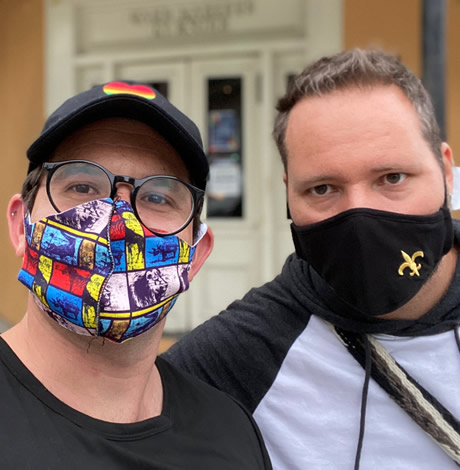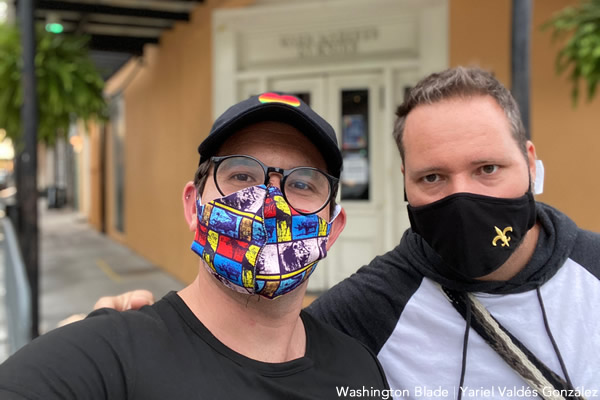Opinions
2021 is the year to dream big
Yariel proves immigrants really make America great


It goes without saying that most of us are more than happy to see 2020 come to an end, but even this dumpster fire of a year could not extinguish the will to fight for a better life. The effort to secure Washington Blade contributor Yariel Valdés González’s release from U.S. Immigration and Customs Enforcement custody is no better example of what is possible.
Valdés and International News Editor Michael K. Lavers share their thoughts about the past year.
By YARIEL VALDÉS GONZÁLEZ
Today I am thinking of the first day of the year and what I asked Santa for Christmas. I was at an immigrant jail in Louisiana, imprisoned for seeking political asylum. Judge Timothy Cole on Sept. 18, 2019, granted me asylum, but a government appeal kept me behind bars, and diminished my hopes of being truly free at every turn.
Resorting to Santa, a childish character in whom adults should not believe, shows how desperate I was. I simply wanted the freedom that I had earned and for which I had suffered so much in Cuba and, incredibly, in the United States. Santa three months later finally granted my wish. I guess immigrants are a low priority for such an honorable and busy character.
My true Santa was really Michael K. Lavers, my brother, my colleague and this publication’s international news editor. It would have been impossible to emerge victorious in this battle without his constant support. I can now dream of a future without persecution because of my profession or ideas thanks to him, my family, and many other people.
Instead, my Santa in 2020 came from the hand of love, which does not need desperate pleas, but tenderness and devotion. Receiving gifts on this date does not exactly fit into the traditions of my native country, whose Communist regime has crushed the Christmas spirit for decades.
I can proudly look back on 2020 without forgetting from where I come. While the whole world tries to erase it from memory, it has been my “Year Zero” when I began to build my new life in every way.
This year has put many challenges and new experiences in front of me: The first and most difficult one was to be released from ICE custody, which kept me in their jails for 11 months. Then came learning how to drive (it wasn’t that difficult); perfecting my rustic English (a task that has not yet been completed); working in a restaurant (I had never done anything outside of media before); be independent (I moved to Wilton Manors with my boyfriend); support the new president as an activist; collaborate with this newspaper that gives me the opportunity to support my community; stay healthy in the middle of this pandemic and endure the sadness that I feel each day for the family and friends I left behind, among other things.
The year that we begin today is going to be better. And I say this as an imposition because it is our positive spirit that will help us overcome all the bumps in the road and will allow us to look to the new year with hope.
Welcoming 2021 in the magical place of Walt Disney World has definitely contributed to that, but above all I am confident that I will not be alone on this journey of growth that has opened up in front of me. Conquering 2021 may seem like an overly pretentious plan, especially for an immigrant who is just beginning to take his own steps in this great country. But if I have learned anything in life, it is to dream big, and 2021 will not be the exception.
By MICHAEL K. LAVERS
Tears were welling up in my eyes on Aug. 8, 2019, when I promised Yariel’s mother in Cuba during a phone call from his aunt and uncle’s home in suburban Miami that I would do everything in my power to secure her beloved son’s release from ICE custody. It took far too long for that day to come, but on March 4 he was sitting in the passenger seat of my rental car as we drove away from the privately run River Correctional Center in rural Louisiana.
More than nine months later, I could choose to focus on the fact that Yariel spent nearly a year in the custody of an out-of-control agency that forces those who seek refuge in this country to endure abuse and dehumanization. I could choose to focus on politicians who use cheap rhetoric to advance a xenophobic agenda. I could choose to focus on the fact that I fractured my left arm hours before Yariel’s release and it took six months to heal. I will, however, avoid the chance to wallow in self-pity because that’s not what this op-ed is about.
Yariel is proof that immigrants truly make America great. He is now living with his boyfriend in Wilton Manors, and has become an active and productive member of the community. Yariel’s reporting continues to highlight the human rights abuses in Cuba that forced him to flee. His advocacy on behalf of other immigrants and ICE detainees continues to inspire me more than he will ever know.
This year has been horrible for so many reasons, but I am immensely thankful that Yariel in 2020 was finally able to begin living his best life in freedom without fear of persecution. He remains an inspiration to me and to countless others. ¡Te quiero mucho mi querido hermano!
Yariel Valdés González is a Blade contributor; Michael K. Lavers is the Blade’s international news editor.

There can be no other word than “insanity” for how the felon in the White House, along with his Nazi sympathizing co-president, are handling things. They are living in an alternative universe where they think they are a king and an emperor. They are happily screwing the American people, while creating havoc in the world. If the courts don’t stop them, and I am beginning to lose confidence in the Supreme Court, only Congress, if its members grow some cajónes, or the American people with their votes, will be able to eventually do it.
As I have written, Democrats will have to appeal to people at the local level district-by-district, to win. There have been discussions online about who the Democrats will put up in 2028. My view of those discussions are they are a waste of time. Debating whether it will be Booker or Buttigieg, and I am getting fundraising appeals from both, or someone else, is totally useless unless Democrats can win this year in New Jersey and Virginia, and then take back at least the House of Representatives in 2026. If Democrats can’t do that, it may not matter who our candidate is in 2028.
I recently went to a meeting to hear David Hogg, one of the new vice chairs of the DNC. He is a great young speaker. One suggestion I had for the DNC was they call out Sen. Bernie Sanders, an independent, when he suggests people can vote for a third party. There are very few districts in the nation where a third party has a chance in hell of winning. What they do, as we have seen over and over again, is to help Republicans.
Since Trump won, the list of those he is screwing keeps growing. Today it includes veterans, farmers, teachers, and students. He and his Cabinet have ended programs that helped protect African Americans, the LGBTQ community, women, Latinos, and poor people. He has stopped progress on cancer research, HIV/AIDS research, and fired people who help predict our weather. He fired, and then had to rehire, thousands of people fired by accident, and those the courts forced the administration to rehire.
Today in the United States we have a measles outbreak, with the first children in decades, dying from it. This because the man Trump has as his secretary of Health and Human Services speaks against vaccines. Now that a-hole is trying to have fluoride removed from our water, based on one study that says twice the amount we actually use, could cause problems. He recently did admit the MMR vaccine can actually prevent measles, and now suggests potentially using it.
Veterans are being fired from civilian jobs in the Pentagon, Veterans Administration, and other agencies. When asked about the firings, Alina Habba, a counselor to the president, had a dismissive response. “Without providing any evidence, Habba claimed that some who served in the U.S. military and went on to take government service jobs were not doing the work.” She wasn’t contradicted by anyone in the administration, or Congress. So, I would question why any veteran would ever again support Trump, or any of his acolytes.
As Trump moves forward with tariffs, we will see who gets screwed the worst. He paused them for 90 days because business leaders, who supported him, began to question his ideas. “Billionaire investor Bill Ackman, a rare critic among U.S. President Donald Trump’s top supporters, has voiced concerns over the president’s tariff strategy, and voiced, ‘this is not what we voted for.’”
Then came the first, if tepid, sign of some Republican senators taking their lips off Trump’s ass long enough to do their job. It was reported, “signs of GOP wariness emerged Thursday. Republican Sen. Chuck Grassley of Iowa teamed up with Democratic Sen. Maria Cantwell of Washington on a bill that would require the president to give 48 hours’ notice to Congress ahead of his imposition of tariffs, and those tariffs would expire after 60 days unless Congress approves them. The bill, called the Trade Review Act of 2025, was an amendment to a section of the Trade Act of 1974.” Then the bond market began collapsing and even Trump’s Treasury Secretary took notice.
Every day we wake up to another egregious thing the president has done, or wants to do. He sees himself as a dictator and is only interested in what he can do to wreak vengeance on anyone not willing to genuflect before him. My hope is people stop genuflecting, and instead, tell him to go f—k himself.
Peter Rosenstein is a longtime LGBTQ rights and Democratic Party activist.
Opinions
Fired. Depressed. Moved to Canada: Tales from Trump 2.0
We must not normalize what’s happening to our country

It’s been difficult to keep up with the news since Jan. 20, as the attacks on our community keep coming. The same president who nominated the highest-ranking openly gay government official ever (Scott Bessent as Treasury Secretary) is the same president who is killing transgender Americans via his incessantly cruel attacks on their humanity. (When you deny someone access to the bathroom, you deny their humanity.)
I have struggled to organize my thoughts about Trump 2.0. Instead, I am sharing anonymized anecdotes from people I know and love who have been adversely impacted by his cruelty. This is just a sampling of what Trump has wrought in barely three months.
• A close friend with a transgender child abruptly packed up and left the country, driving to Canada. I had no idea until a cryptic social media post prompted me to call. Their trans child no longer felt safe in our country. My friend sold the family home, packed the car, and drove to Canada. My heart breaks for their beautiful family, now geographically separated because of Trump’s attacks.
• Another friend in a high-ranking job was singled out by the MAGA social media mob. She was derided as a “DEI hire” simply because she’s a lesbian. The FBI came to her home and advised building a panic room. She now travels with armed security, something she never had to do before Trump.
• A friend was offered a job by a major news outlet. The offer was rescinded after their boss discovered a nearly 10-year-old blog post they wrote that was critical of Trump. Yes, the mainstream media are caving to Trump’s threats.
• Yet another friend in a senior civilian government post has been forced to fire longtime employees and remove any mention of the LGBTQ community (to which he belongs) from a government website. This includes important studies on LGBTQ health and wellness.
• And another friend who was fired from her federal government job is struggling with depression, unable so far to find a new job after a career in public service that ended with a dismissal for no reason.
Welcome to MAGA’s America, where public servants are ridiculed, threatened, and fired. Where mothers and fathers of transgender children are fleeing the country because their child fears being killed here. Where hard-working business leaders who happen to be LGBTQ or women or Black are targeted and doxed by Trump’s brainwashed, bigoted followers. Where one-time corporate “allies” are running like cowards from their DEI programming and support for the LGBTQ community.
At the Blade, I have fielded multiple requests from sources asking that their names be removed from past news articles because they fear government retaliation merely for being publicly identified as LGBTQ. We’ve never needed a formal policy for such requests until Trump returned to power. After consulting with experts in journalism ethics, we have decided to take such requests on a case-by-case basis. We have a unique contract with our readers, very different from mainstream outlets like the Washington Post, and will find a workable solution as these questions arise.
So now what? Those of us in a position to resist must do so. We must not normalize what’s happening to our country. Firebombing a governor’s residence; storming the U.S. Capitol; plotting to kidnap Democratic governors — none of this is normal or “OK,” as Pennsylvania Gov. Josh Shapiro said in a major understatement last weekend.
Join the growing protest movement around the country. Call and write to your elected representatives urging them to oppose Trump’s agenda, from his stupidly reckless tariff policies to his anti-trans attacks. Attend local town halls with elected officials and denounce the mass firings of federal workers. Read and donate to your local media outlets doing their best to cover all of these attacks on democracy.
And, perhaps most crucially, do what you can to support Democratic candidates running in the 2026 midterms. Our only hope of saving American democracy and the Constitution may be for Democrats to retake one or both houses of Congress next year. The Republicans have a narrow 220-213 majority. Last week, the Democratic Congressional Campaign Committee highlighted 35 GOP-held districts it is targeting in 2026; they only need to flip seven of those. The Senate will be a bigger challenge, though not impossible, as Democrats would need to flip four seats to take control. They have a good shot in Maine and North Carolina. With Trump’s plummeting approval ratings and an economy headed for recession, the Alaska and Ohio Senate races could also be competitive.
Stay engaged and informed. Reach out to friends who’ve lost their jobs to Elon Musk’s craven chainsaw approach to gutting the federal government. Do what you can to support and reassure the trans community that we have their backs. We know better than anyone that silence equals death. So find your voice and speak out.
Kevin Naff is editor of the Washington Blade. Reach him at [email protected].
Opinions
Keir Starmer has blood on his hands
British prime minister’s foreign assistance cuts will kill people with HIV

My name is Mijan. I’m a born and bred East Londoner, a child of immigrants, an ACT UP London/UK activist, and I live with HIV. ACT UP UK and our kin across the pond, ACT UP US, was founded to fight and champion rights of people living with and affected by HIV/AIDS. We are a global coalition that believes in Fund Healthcare Not Warfare, a transatlantic movement that demands global health justice and an end to military prioritisation over the health and wellbeing of human life. The threats we face are the same from funding cuts, state suppression, and queer erasure. U.S. or the U.K. we sing from the same hymn sheet: We will not stand by while our lives are at risk.
On April 8, eight of us ACT UP Activists disrupted Prime Minister Keir Starmer’s Liaison Committee. We were peaceful and determined to execute our die-in. Security was almost as determined to make sure we didn’t. They strong-armed us out of parliament like we were a threat. We tried to begin our die-in, to make a statement for the lives at stake, but instead we were rammed out the revolving doors as we were leaving, which they ended up jamming and dumped on the stairs of Portcullis House. We made the best of a bad situation and laid on the dirty grounds — because this is what democracy looks like in the U.K. when it’s under attack.
Why were we there? Because we are scared and angry. Because we are regressing. Because AIDS cuts means death.
Keir Starmer’s Labour government is enacting the most drastic reduction in U.K. AID cuts we have seen in many years, slashing it from 0.5 percent of gross national income to 0.3 percent by 2027. This is the lowest level of Official Development Assistance spending in years — and it’s being justified to increase defense spending. More missiles, fewer medicines. More tanks, fewer treatments.
Starmer, you justify this under the guise of “security” — but whose security are you protecting? It’s not mine. I live with HIV, and I’m only alive today because of global health funding, funding that made treatment, programs, and vital research possible. Thanks to that support, HIV is no longer a death sentence for many of us. But that’s not the case for everyone.
Not everyone has the privilege of being born in countries like the U.K., where treatment is accessible and free. Many will die because of funding cuts. Many will lose loved ones. We will see HIV contraction rates rise. We will see preventable deaths increase.
Kier, what you are doing is wrong! What you are doing is horrible! What you are doing is deadly!
Don’t take my word for it. Listen to our world health experts. The World Health Organization’s Director-General, Tedros Adhanom Ghebreyesus, has warned that these cuts could cause over 10 million additional HIV infections and three million HIV-related deaths. A new modeling study published in the Lancet HIV by the Burnet Institute backs this up — projecting a 24 percent reduction in international HIV funding by 2026 if current trends continue. Twenty years of progress in HIV treatment and prevention could be wiped out by a single budget.
Deplorable.
Is this what Labour stands for? I thought this party would fight for us.
HIV/AIDS disproportionately affects queer people and people of color — already marginalized communities who are now being discarded. Labour was created by and for people who lived on the fringe of society, the little guy. Labour is meant to empower, support and protect the vulnerable, not sacrifice them. Labour is meant to listen to the people, not silence them and ram them out like cattle to slaughter. Labour should be ashamed. You are not for the people.
We were there for a reason. We were there because lives depend on it. We showed up because diplomacy failed. When we chose peaceful protest, we were met with aggression and suppression. That’s what we need to talk about too. Because this isn’t just about foreign aid anymore — this is also about our right to protest being attacked.
When activists are forced out of parliament for daring to peacefully protest against inhumane policies, it truly puts into perspective a dying democracy.
Democracy is no longer open to the people. Our ability to protest is now treated as a threat to power. Our democracy is under threat. And it’s not just from Tory strongmen. It’s from the very party that’s supposed to be on our side.
This Labour government has abandoned its principles and has abused people’s trust. That it will turn its back on migrants, on the poor, on queer people, on disabled people, and now — on people living with and at risk of HIV/AIDS. It is morally bankrupt.
Bombing your way to justice will not achieve equality. Ignoring a global health crisis and is not progressive. Get your priorities straight: Fund health care, not warfare. Invest in life, not death. Restore the 0.5 percent foreign aid commitment, and stop treating the most vulnerable lives on the planet as expendable.
Keir Starmer, you have blood on your hands.
You may have pushed us out of parliament, but we will not be silenced. We will be louder. We will be bolder. We will not let this die. ACT UP has always believed in one simple truth: SILENCE = DEATH.
Mijan is a pseudonym for an HIV-positive activist who believes that SILENCE = DEATH.
-

 State Department4 days ago
State Department4 days agoHIV/AIDS activists protest at State Department, demand full PEPFAR funding restoration
-

 Brazil5 days ago
Brazil5 days agoUS lists transgender Brazilian congresswoman’s gender as ‘male’ on visa
-

 District of Columbia4 days ago
District of Columbia4 days agoCapital Pride wins $900,000 D.C. grant to support WorldPride
-

 Obituary3 days ago
Obituary3 days agoLocal attorney, LGBTQ rights advocate Dale Sanders dies at 75












